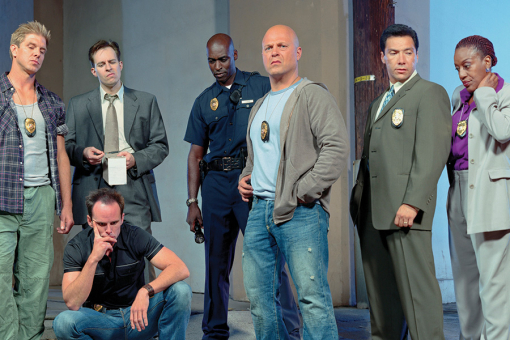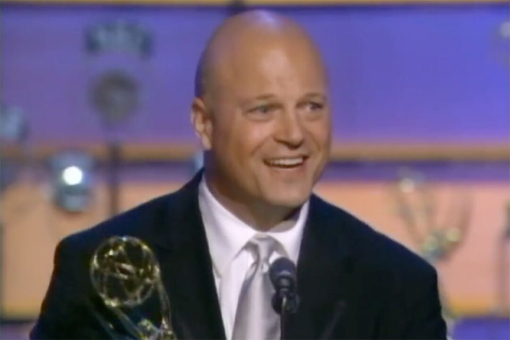For more than two decades, Emmy-winning director Michelle MacLaren (Breaking Bad, Game of Thrones) had been looking for a very specific project.
Genre, setting and story mattered less than the potential to work with one of her closest friends, Michael Chiklis, who's known for playing corrupt cop Vic Mackey on The Shield.
The two have been pals since 1992, when they met in a Vancouver hotel gym — he was shooting The Commish and she was production-managing a Diagnosis Murder telefilm. MacLaren knew that the project she sought had to be uniquely suited to Chiklis's talents, with a role she couldn't imagine anyone else playing.
Cut to 2018, when a pilot script by Josh Gilbert and Michael Carnes crossed her desk. It was the story of Ben Clemens, a lifelong border-patrol agent who, after being forced into retirement, makes a trip to Mexico and soon becomes entangled in the lives of those he'd spent his career dismissing and working to keep out of the U.S.
The black-and-white values that informed his career and past actions are challenged as circumstances drive him to help a young girl cross the border and even bring a drug cartel into his life.
There was no doubt in MacLaren's mind who should play Ben. And now that Coyote is streaming on CBS All Access, she's just as confident of that opinion.
MacLaren and Chiklis, along with David Graziano (American Gods, Jack Ryan), recently joined emmy contributor Alexander Huls to discuss the show. All three are executive producers of Coyote; MacLaren also directed two episodes; Graziano was also showrunner.
Q: Michael, how did Michelle first tell you about the project?
Michael Chiklis: Michelle called me out of nowhere and said, "I found it."
Michelle MacLaren: I said, "I want to pitch you something." So we went out for dinner.
MC: I can't tell you how thrilled I was. I told her, "Of course I'm interested. Are you kidding me?"
MM: I've never taken him anything until now because I wanted to wait until the right thing. In my gut, I thought, "This is it." I felt very optimistic that he was going to feel the same way.
Q: Was there a moment early on where you realized mixing the personal and professional was going to work well for you?
MM: I was in Mexico [location-scouting in the desert] and Michael was in L.A. I called and said, "Look, we have a choice to make. If we go to these really remote locations, it's going to be hard. Physically hard. At some point you're going to look at me and swear. I think we can do it, but I can't do it unless you and I are in it together."
MC: I told her, "Let's go. Let's swing for the fences."
MM: That was 26 years of friendship and trust.
Q: How did David come aboard as showrunner?
David Graziano: We had talked about it, and I was thinking about the project, but I got pulled into another show. I did that for about six months, but I could not get this pilot out of my head. I came back to Coyote. I said, "There's something here that's pulling me in. Can I sit down with you guys again if you haven't found somebody?"
MM: He came into the first meeting and pitched us the opening of the show, and Michael and I were like two little kids kicking ourselves under the table because we were so excited about what he had to say. We thought, "This is our guy."
DG: I was glad they didn't find anybody.
Q: What was it about Coyote that appealed to you?
MM: What I really loved about it was an opportunity to tell a story that starts a conversation. We wanted to do something that potentially opens people's eyes to realizing — as Ben Clemens realizes — that the world is not black and white. It's gray.
MC: I'm attracted to characters that are complex. It's boring to play someone who's written as one thing or the other. It's really interesting to see a 50-something-year-old white guy from the United States — who has looked at the world through a particular prism — have all of his choices taken away.
DG: I wanted to watch a guy who has been very closed-minded his whole life, very black and white because of this job, professionally callused, and completely unaware of the ways he has been corrupted by the institution he works for. I wanted to watch that all melt away over time because of experiences with another culture — a culture he used to [work to] keep out of the country.
Q: What was it about Ben that drew you all in?
MM: This character thinks he's always doing the right thing. He's been in law enforcement his whole career, always thinks he's a good, upstanding guy. Now, he's going to find out that's not necessarily the case. He's finding out who he really is and who he has been.
That's very different from [Breaking Bad protagonist] Walter White, for example, who crosses a moral line and justifies going deeper.
Same with Vic Mackey, who in the [Shield] pilot shoots a guy in cold blood. He's a dark, morally compromised character who thinks that that's the right thing, too. Whereas Ben, reluctant as he is, when faced with basic human dignity, with basic human kindness, he steps up to help and does the right thing.
MC: ["Breaking good"] was something that Michelle said early at that first dinner, and that appealed to me.
DG: We've all seen how the canon of modern premium television is rife with middle-aged white dudes spiraling down the vortex of life. [Ben] is on the opposite trajectory of Vic Mackey or Walter White . This is like the reconstruction of a man.
Q: Michelle and Michael, given your associations with Breaking Bad and The Shield, were you worried about the shadows of Walter White or Vic Mackey?
MC: Even though there's some crossover in tone and tenor with Vic Mackey, he has nothing to do with [Ben]. This is a good man who has made horrible mistakes and is basically trying to rewrite his own epitaph. He's trying to salvage his life.
MM: Those two characters are very different from Ben. When we were shooting, Michael and I talked a lot about that. There are many situations that Ben finds himself in where we consciously made sure it was Ben Clemens that showed up, not Vic Mackey.
MC: You might see me [as Ben] on a poster, or getting into a physical altercation in a preview, and jump to a conclusion. But when you watch Coyote, I think people will get immersed in the story and forget all about that.
Q: Some of the gray areas Michelle mentioned earlier apply to other characters. For example, you humanize some of the drug cartel members Ben comes up against. Why that approach?
DG: The rule in the writers' room was there are no good guys and there are no bad guys. Every single character in the show is the hero in their own story. We didn't make judgments about anything.
MC: We wanted to be uncompromising and include every point of view, and go from that place that Michelle and I are very used to, having spent so much time on Breaking Bad and The Shield. We wanted to do this in a way that was not telling you what to think.
DG: What I wanted was that the audience bring their own biases to the show and make a quick judgment about the characters and who they are, then be surprised little by little every episode.
Q: Coyote feels more authentic in its portrayal of Mexico — especially the small towns — than some shows about drug cartels. How did you create that authenticity?
MM: We were excited to be able to incorporate the actual part of Mexico that we were shooting in — the people, the culture. That was very important to us, from music to clothing to production design.
DG: There's a lot of details that you need to get right.
MM: Our crew was 92 percent Latin, the cast was 72 percent Latin, and we had Latin writers [María Renée Prudencio, Katrina Cabrera Ortega] and consultants. We really wanted to do this as a collaboration and do it as authentically as possible.
Q: The border isn't just a complicated issue, it's highly politicized. Were you nervous about tackling that?
DG: It's like walking a fence. On one side, you're afraid of alienating the Border Patrol. On the other side, you're afraid of upsetting people for whom, rightly so, that wall is a symbol of oppression. I hope we got it right, but the approach we took in the writers' room was that we're just asking questions.
MM: We don't have the answers. We don't know how to solve the situation, and we're not trying to preach anything.
MC: Of course, that made me trepidatious. But we agreed from the get-go that we were not doing a political show. We were going to reduce this very hot political potato to its human element and tell compelling human stories that deal with the realities of what's happening.
MM: We want the world Ben is living in to be very real and grounded and honest and true. There's no way to tell that story if you're not willing to jump in and confront the real issues and discuss them and open people's eyes to them. A lot of people are very aware that there are issues. I just don't know that everybody has the ability to look at different points of view.
MC: Whether it's books, plays, film, television or art, they give people an opportunity to explore all the nuances of any given topic without getting bogged down in the politics of it. Let's take a look at the things that are happening in our world through drama and comedy.
DG: As long as we do our homework and do it with a level of expertise and humanity, we can have a conversation that almost no one else can.
Q: Michelle and Michael, if you look back on making Coyote, were there any specific moments where you thought, "That's my friend."
MC: We shot at the border for days, and there were dozens of cars and hundreds of people involved. It's just a massive undertaking. And here's my friend, Michelle, and she's just handling it. I was sitting in the car waiting for the shot, watching her, just filled with pride.
MM: I'm thinking of the fight sequence at the end of the pilot. Ben is in hand-to-hand combat. This is very raw, physical and down and dirty. We break it down into pieces to build in emotional beats. You want to build an arc to this so that you're in it with him.
Michael is so great at that. He's such a wonderful actor, emotionally and physically. You can see it on his face. You can feel it in his body. Afterwards, I was so proud of my friend.
Q: What are your hopes for the show?
MM: It's so weird when you launch a new show — you have no idea what anybody's going to think. All we can do is try our best. I feel that I was very privileged to spend a year with a group of people who all tried their best, and that's all we can ask for.
MC: I hope, first and foremost, that people watch it and are totally entertained and can't wait to go to the next episode — but also that it evokes some conversation and some emotion. I don't think you could benignly watch this show and then turn it off and go, "Okay, what's next?"
This article originally appeared in emmy magazine, Issue No. 2, 2021















